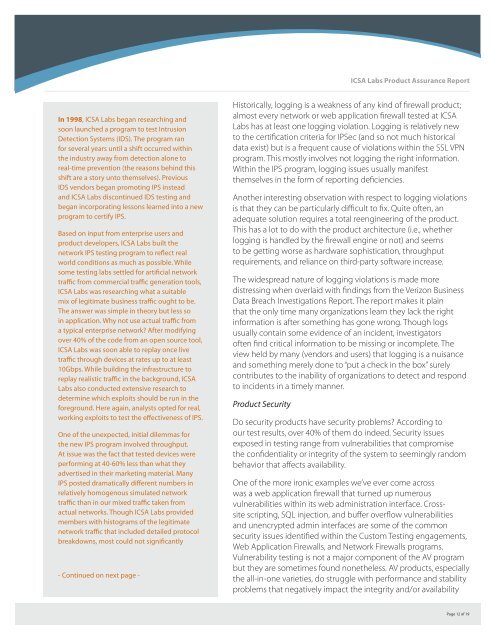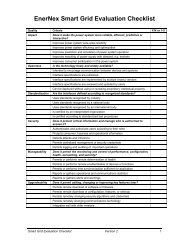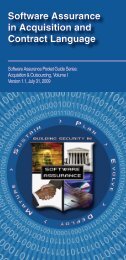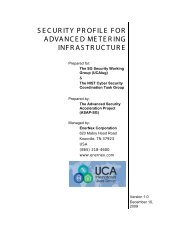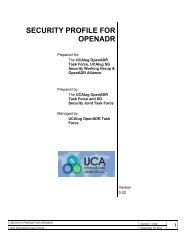ICSA Labs Product Assurance Report - Verizon Business
ICSA Labs Product Assurance Report - Verizon Business
ICSA Labs Product Assurance Report - Verizon Business
Create successful ePaper yourself
Turn your PDF publications into a flip-book with our unique Google optimized e-Paper software.
<strong>ICSA</strong> <strong>Labs</strong> <strong>Product</strong> <strong>Assurance</strong> <strong>Report</strong>In 1998, <strong>ICSA</strong> <strong>Labs</strong> began researching andsoon launched a program to test IntrusionDetection Systems (IDS). The program ranfor several years until a shift occurred withinthe industry away from detection alone toreal-time prevention (the reasons behind thisshift are a story unto themselves). PreviousIDS vendors began promoting IPS insteadand <strong>ICSA</strong> <strong>Labs</strong> discontinued IDS testing andbegan incorporating lessons learned into a newprogram to certify IPS.Based on input from enterprise users andproduct developers, <strong>ICSA</strong> <strong>Labs</strong> built thenetwork IPS testing program to reflect realworld conditions as much as possible. Whilesome testing labs settled for artificial networktraffic from commercial traffic generation tools,<strong>ICSA</strong> <strong>Labs</strong> was researching what a suitablemix of legitimate business traffic ought to be.The answer was simple in theory but less soin application. Why not use actual traffic froma typical enterprise network? After modifyingover 40% of the code from an open source tool,<strong>ICSA</strong> <strong>Labs</strong> was soon able to replay once livetraffic through devices at rates up to at least10Gbps. While building the infrastructure toreplay realistic traffic in the background, <strong>ICSA</strong><strong>Labs</strong> also conducted extensive research todetermine which exploits should be run in theforeground. Here again, analysts opted for real,working exploits to test the effectiveness of IPS.One of the unexpected, initial dilemmas forthe new IPS program involved throughput.At issue was the fact that tested devices wereperforming at 40-60% less than what theyadvertised in their marketing material. ManyIPS posted dramatically different numbers inrelatively homogenous simulated networktraffic than in our mixed traffic taken fromactual networks. Though <strong>ICSA</strong> <strong>Labs</strong> providedmembers with histograms of the legitimatenetwork traffic that included detailed protocolbreakdowns, most could not significantly- Continued on next page -Historically, logging is a weakness of any kind of firewall product;almost every network or web application firewall tested at <strong>ICSA</strong><strong>Labs</strong> has at least one logging violation. Logging is relatively newto the certification criteria for IPSec (and so not much historicaldata exist) but is a frequent cause of violations within the SSL VPNprogram. This mostly involves not logging the right information.Within the IPS program, logging issues usually manifestthemselves in the form of reporting deficiencies.Another interesting observation with respect to logging violationsis that they can be particularly difficult to fix. Quite often, anadequate solution requires a total reengineering of the product.This has a lot to do with the product architecture (i.e., whetherlogging is handled by the firewall engine or not) and seemsto be getting worse as hardware sophistication, throughputrequirements, and reliance on third-party software increase.The widespread nature of logging violations is made moredistressing when overlaid with findings from the <strong>Verizon</strong> <strong>Business</strong>Data Breach Investigations <strong>Report</strong>. The report makes it plainthat the only time many organizations learn they lack the rightinformation is after something has gone wrong. Though logsusually contain some evidence of an incident, investigatorsoften find critical information to be missing or incomplete. Theview held by many (vendors and users) that logging is a nuisanceand something merely done to “put a check in the box” surelycontributes to the inability of organizations to detect and respondto incidents in a timely manner.<strong>Product</strong> SecurityDo security products have security problems? According toour test results, over 40% of them do indeed. Security issuesexposed in testing range from vulnerabilities that compromisethe confidentiality or integrity of the system to seemingly randombehavior that affects availability.One of the more ironic examples we’ve ever come acrosswas a web application firewall that turned up numerousvulnerabilities within its web administration interface. Crosssitescripting, SQL injection, and buffer overflow vulnerabilitiesand unencrypted admin interfaces are some of the commonsecurity issues identified within the Custom Testing engagements,Web Application Firewalls, and Network Firewalls programs.Vulnerability testing is not a major component of the AV programbut they are sometimes found nonetheless. AV products, especiallythe all-in-one varieties, do struggle with performance and stabilityproblems that negatively impact the integrity and/or availabilityPage 12 of 19


